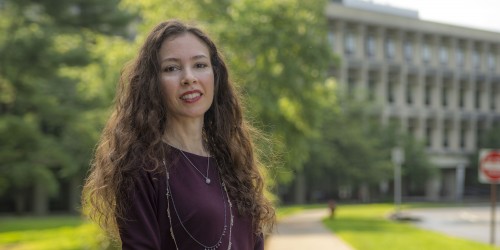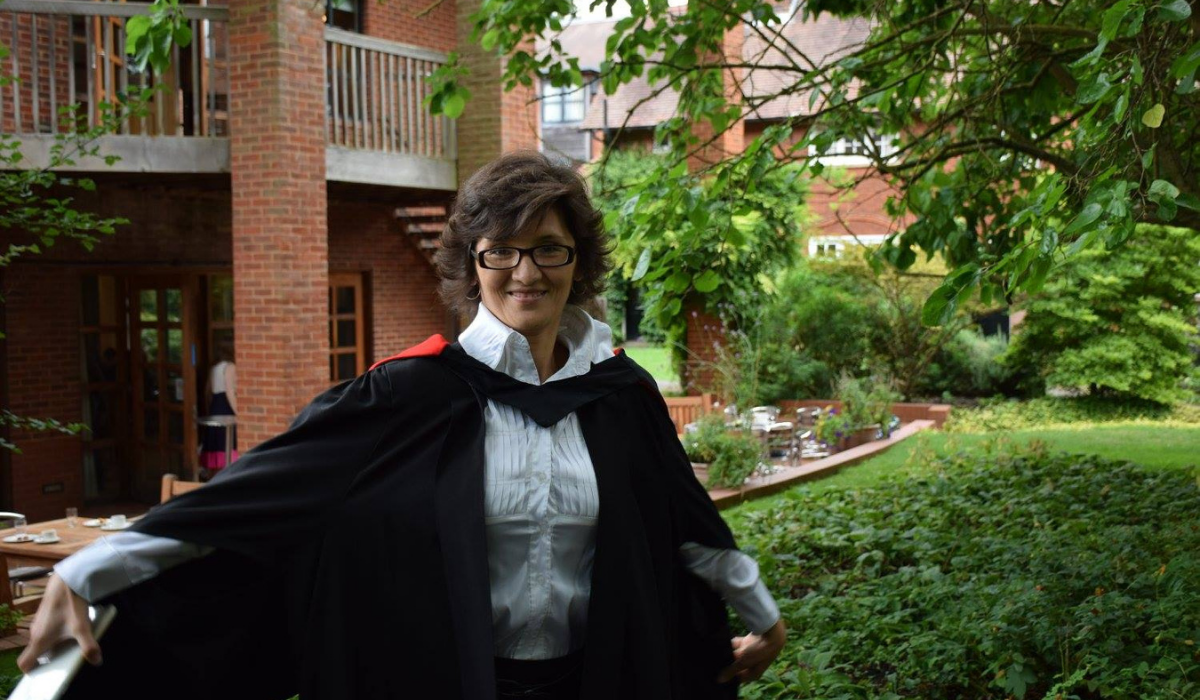
Making a positive social impact on new generations of leaders and entrepreneurs
Alumna Dr Ana Cristina Siqueira tells us about her inspiring career aligning economic, social, and environmental goals
Guljakhon talks about her studies, research and career within the United Nations
Lucy alumna Dr. Guljakhon Amanova (PhD student, Law, 2012) works as a National Program Officer at the UN Regional Office for Central Asia, Office of the United Nations High Commissioner for Human Rights (OHCHR), Uzbekistan.
In this inspiring article she tells us about her PhD, career and time at College.
The Human rights situation in Uzbekistan has never been very good, which motivated me to become a lawyer and help poor people find justice and truth. Being born in Andijan, a city in the eastern part of the Fergana Valley in far eastern Uzbekistan, I dreamed of being a lawyer, and for that had to go to Tashkent – capital of Uzbekistan – to enter one of the three at that time law schools in Uzbekistan.
Before Cambridge, I graduated from the National University of Uzbekistan, Faculty of Law, cum laude.
Being a young idealist, a law student, I believed I could change the world or at least something in Uzbekistan, but felt that I lacked enough knowledge. I went to additional training, participated in international law competitions, and won several of them, including National and Regional Rounds of Jessup Moot Court Competition and OSI Competition on UN Human Rights Protection System.
I was helping people, defending them, representing them at national level, and trained other lawyers and civic activists, but I still felt that there was something missing. I did not feel that I was heard or that I was able to convince even my colleagues that it is bad to beat their children, that habeas corpus in Uzbekistan criminal legislation is not really “habeas corpus” under the ICCPR, Article 9, that Views of the UN Human Rights Committee were not “just recommendations” for the state.
I then decided that I had to have a PhD degree from a top university, mistakenly thinking that this would mean something for those who just do not want to hear or understand, or that sometimes it is not the state, but the international “agreement” to keep human rights on a very low level to be able to corrupt, steal from the people of a country oil, gas, gold and human resources.
My PhD thesis was about The Impact of the UN Human Rights Committee Reporting Procedure on Central Asia. I analysed the impact or influence of the Committee, meaning any changes of implicit or explicit principles, norms, rules, and decision-making procedures that concern implementation of and/or compliance with the International Covenant on Civil and Political Rights (ICCPR). I conducted both desk studies and field research in Central Asia to deepen my knowledge and understanding of the situation not even just as a human rights activist, but more neutrally, as an independent academic. I also gained profound knowledge of the norms and procedures of the UN Human Rights Committee literature, and as an assistant to a UN HRCttee member.
Based on the findings during my studies and practices, and in light of compliance theories in international law and international relations theories, I was able to identify the impact, that I did not see before, that the Committee had in influencing the Central Asian states directly through different forms of frequent interactions with state officials and non-governmental organisations, and through indirect stimulation of process of learning, and communication between relevant domestic actors (e.g., state officials and lawyers, civic activists, national and international NGOs). For example, the State Reporting Procedure of the Committee encourages the state to revise its legislation at least every 4 years to make it in line with the ICCPR; to meet more with civil society representatives and listen to them more carefully.
Four and a half years of academic research under the supervision of eminent experts on human rights law, including Dr Sarah Nouwen and Prof. James Crawford, a legend of international law, a judge of the International Court of Justice, allowed me to gain profound knowledge of the procedures and practices of the UN Human Rights Committee and other UN human rights protection mechanisms. This study also inevitably enhanced my research, analysis and writing skills. Carrying out my field research in Central Asia, I also enhanced my intercommunication skills. As a result, I established many important contacts and met with different state officials, IGOs, UN agencies, NHRIs, as well as NGOs and individuals, and gained all the necessary information. While not all the findings were included in the final thesis, all of the research has given me a deep and sophisticated understanding of domestic specifics on the ground to prevent or facilitate the implementation of human rights obligations by the states while preserving an international perspective.

My PhD studies were the last stage of my idealistic vision of the world and myself, yet it inspired me to go further, to fight for human rights in my country, understanding the reality and the role of the United Nations for each country without over- or underestimation of this role. And I hope all that I am doing now will have its results in the future, and the Uzbekistan society will be more democratic, liberal, tolerant, open, and will not have fears or tears while interacting with the state.
As soon as I returned to my home country with a PhD from the University of Cambridge (Faculty of Law), I started working for the UNODC Regional Office for Central Asia. Interestingly, my application to the UN Agencies country office was not successful in Uzbekistan, but I was immediately invited to a UN regional office – first to UNODC and then to UN OHCHR, where I am working now. Probably, I had to apply my enhanced knowledge about the region, while working for “regional”, not a country office.
When I arrived at Lucy, it wasn’t possible for them to accommodate me with my daughter. However, I became a Family Officer at the Graduate Union of the University and my tutor Dr Susan Jackson – the best tutor, friend and the best moral supporter - helped me to get through this, and I eventually spent my last year in Lucy accommodation with my daughter. Her kindness and advice helped me to continue and finally to complete my studies. I received financial support for childcare from the College, Santander Universities, Roberts Fund, the Cambridge University Access to Learning Fund, and Childcare Fund. Without such support I would not have been able to complete my studies.

I will always remember the atmosphere of the College, starting from the very entry, our lovely, amazing, helpful porters, who made me love this place so much.
Our librarians, especially Jo Harcus (Librarian at the time of my studies), not only helped me to find all the necessary literature and provide a place to write my dissertation, but they created a home-like environment where I loved spending my time and working on my thesis.
I enjoyed my time in Cambridge. I wish to thank Lucy Cavendish College and its people. While my experience at Lucy didn’t have an easy start, very soon I understood that it was the best choice and the best place, where students’ concerns are heard and taken into account, where our voice is always loud, and where students receive maximum support. I loved the environment and I miss it a lot.

Alumna Dr Ana Cristina Siqueira tells us about her inspiring career aligning economic, social, and environmental goals

Beyond Storm and Stars celebrates the resilience of the human spirit and the courage of individuals, communities, and societies to transform…